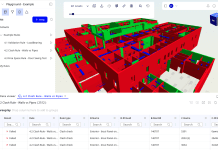The Access Group takes a look at the CBI’s recent Fine Margins report and discusses how estimating software can help contractors avoid unusually low or high tenders
The Confederation of British Industry (CBI) recently released a report called Fine Margins outlining the difficulty of profit in the construction industry. The CBI doesn’t just speak of rising costs as an issue, it also highlights the current habits within the sector and how this impacts margins. CBI categorises the report as a “call on businesses to break from poor habits, and on clients to bring new behaviours to the table”.
Alongside the CBI, the Construction Products Association (CPA) conducted an extensive survey with manufacturers of construction materials and the consumers, ie contractors. National operations have been shaken by the Covid-19 outbreak, and construction has been affected significantly, but now is the time to start planning for your company’s future success.
Current red flags within the industry
Businesses can’t be blamed for finding the lowest bid received attractive. In the current climate, it isn’t just money-saving – it’s business security.
However, these often contain unrealistic figures meaning that the knock-on effects, should a product have to be substituted or timescales change, will not be accounted for in the subsequent budget or project timescale. Unfortunately, this isn’t a rarity. The CBI found around 90% of construction projects experience a level of delay greater than 10%.
There needs to be a wider acknowledgement of the damage caused by offering up a low-ball bid within the industry, as well as the damage caused by a contractor accepting an offer that seems too good to be true.
Low-ball bids not only have a drain on money and resources, they also impact safety along the supply chain and after project completion. The CPA found in its report that in “more than half of the projects involving substitution, the substitution was not discussed and agreed among the project team, and the performance criteria of the replacement product was not compared to the original to ensure that they were equivalent”.
For construction to increase productivity, this needs to be the responsibility of all, but that can only be achieved if files are readily available and accessible for everyone in a company to view.
What are the recommendations?
The CBI believes that, ideally, both “parties [should] come together in an open and collaborative dialogue to discuss the project brief and set expectations around contract terms”. This then paves the way for “transparency, drives fair competition, and provides clients with confidence on the delivery, cost and timeframe for the asset” moving into a second procurement stage.
Implementing a second procurement stage means that the tendering process will be longer, but it is important to note that companies who choose this method end up being able to predict overall costs more accurately, as realistic expectations from all involved are set from the start. The importance of building that relationship with contractors early on ensures that each stage of the project becomes more transparent and the areas that contain possible project risk can be identified and precautions put in place quickly. The CBI recommends that parties adopt “a gain/pain share approach to incentivise appropriate allocation of risk between” them.
It doesn’t just ensure that you have a more concrete view of the project ahead, it gives proven savings. The CBI found that those who participated in their two-stage procurement study experienced between 6-26% cost savings. The traditional approach that ‘all time is money’ is proving to be too simplistic for these projects. While true that there is money to be made by saving time on tasks such as admin, which we discuss later, it is becoming clear that the initial planning stages of a project should not be rushed and this leads to significant savings by completion.
How technology can help
The report by the CBI highlights the importance of technology investment to break the productivity rut, and subsequently identifies that this won’t happen unless the industry changes its ways. In short, “improving margins could therefore unlock hundreds of millions of pounds more, which could be spent on research and development, training and technology”.
The CBI summarises that “the expenditure required for…the adoption of smarter techniques and processes is too prohibitive, while low margins do not give businesses the confidence to invest”.
The way construction is operating means that money is held up in various stages of projects, causing a ripple effect of late payments and headaches throughout the supply chain. The CBI suggests “intelligent procurement, putting contractors on a stable footing and unlocking investment throughout the supply chain will speed up the transformation of the industry”.
Construction is facing evolving challenges and this isn’t likely to change soon. But looking to the future, construction is an essential sector and needs to be resilient and ready to take on an expected increase in demand. How can businesses ensure that they’re prepared to not only take on extra work, but keep their margins looking healthy and sustainable?
Intuitive estimating software such as Access ConQuest Estimating can alert you to unusually low or high tenders, meaning that your business can take a proactive approach in changing industry standards. Having up-to-date information all in one place also ensures that you can make more informed decisions when considering product substitution or want to delve into individual timescales within a project. This helps to develop smarter procurement as suggested by the CBI, by providing the tools to make sure accuracy can be improved, mistakes can be minimised and costs can be kept down in a way that benefits the sector.
It will be a bumpy road, but investments with a nod to the future – along with adapting how projects are planned – are the best ways to ensure your business is ready to hit the ground running.
Jonny Hayes
Construction Software Consultant
Access ConQuest Estimating
Tel: +44 1206 322 575
SCS.Marketing@theaccessgroup.com
Please note: this is a commercial profile.







![[Video] Fireco: 80 new fire doors required for residential flats in London](https://www.pbctoday.co.uk/news/wp-content/uploads/2025/04/2024-06-01-Lords-view-one_1200x750_004-218x150.webp)






